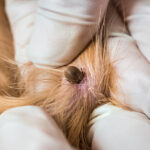Smart, wriggly, and endlessly entertaining! Ferrets are full of boundless energy and overwhelming curiosity. Unfortunately, that endearing combination of curiosity, energy, and litheness can lead them into some dangerous situations. It can also put them in situations where they may eat something they shouldn’t! There are many items which your curious ferret should never eat. These include things like medications, household cleaning products, and certain foods.
Ferrets taste everything!
According to Dr. Sharon Vanderlip, DVM, “Ferret poisonings are difficult to treat and often end in death.” A ferret’s inquisitive and fearless nature will cause him to ‘sample’ anything he can get his mouth on. Unfortunately, that kind of indiscriminate sampling can cause serious problems for your beloved pet!
By his very nature, he’ll explore new substances with his mouth and try to eat anything he can manage to swallow, chewed or not. You wouldn’t try to eat that used dryer sheet hiding between the dryer and the wall but your ferret might! He isn’t put off by odd smells or even nasty tastes. Instead, they may intrigue him enough that he’ll want to explore them further – with his mouth!
The best way to protect your pet is by knowing what the dangers are and doing your best to keep them out of your ferret’s reach. This can be difficult, since your pet ferret is built to explore even the most inaccessible (to us) nooks and crannies of a home. You’ll have to be even more diligent at keeping items out of your pet’s reach than he is at finding them!
Foods a ferret shouldn’t eat
Chocolate is high on the list of foods a ferret shouldn’t eat. As little as 2 oz. of milk chocolate or just 1/10th of an oz. of baking chocolate is enough to kill a two pound ferret, according to Dr. Gary Brummett, DVM.
Xylitol is a popular sweetener made from birch sap, corn, plums, and raspberries. It’s commonly found in ‘sugar-free’ gums, mints and candies, baked goods, and some peanut butters. It’s also found in many dental products, such as toothpaste and mouthwashes, plus sore throat lozenges, cough drops, and children’s multivitamins. Keep all products containing xylitol out of your ferret’s (or dog’s) reach!
Even food residues you wouldn’t consider edible can poison your ferret when he tastes them. Things like coffee grounds and used tea bags are just garbage to us but they’re part of a ferret’s smorgasbord. Unfortunately, they may contain enough residual caffeine to poison your pet.
Often, there isn’t enough reliable information available to know for sure that a food is safe for ferrets. It’s better to not feed something to your pet unless you’re absolutely sure it’s safe. That old adage about “better safe than sorry” definitely applies to a ferret’s diet!
The dangers of common household items…
Do you ever find loose change hiding in your couch? If you can find it, your ferret can too. Unlike you, however, your pet will probably eat those stray pennies when he finds them! Unfortunately, the zinc in pennies is toxic.
Ferrets are fond of chewing on anything with a rubbery or squishy texture. Computer power cords, rubber bands, pencil erasers, elastic hair ties, ear plugs, and flip-flops are just some of the common household items ferrets like to chew. Occasionally, chewing will end with swallowing, which will sometimes cause choking or an intestinal blockage. All of a sudden, that urge to chew has turned into a life-or-death emergency!
Keep houseplants out of your ferret’s reach. That goes for dead leaves, dropped petals, and other plant debris, too. Even water that runs through the soil and out the bottom of the pot may contain enough fertilizer residue to make a ferret who drinks it very sick!
Your pet ferret is more sensitive to essential oils than you are. The phenols from the essential oils may build up to toxic levels in his liver. Many ‘natural’ cleaning products contain essential oils, as do cedar and cedar shavings. It’s best to keep these products away from your pet and thoroughly air out any room in which you’ve used them before allowing him in.
… and chemicals
Residues from cleaning products, as well as the products themselves, are often toxic to ferrets. All cleaning product residue should be thoroughly rinsed or vacuumed away before allowing your ferret back in the area. Never spray chemicals anywhere near your ferret. This includes where he eats, drinks, plays, or sleeps.
Nicotine is bad for humans and ferrets. The difference is that a ferret exposed to nicotine probably won’t live long enough to become addicted! Always keep cigarettes out of your ferret’s reach. That goes for cigarette butts and ashtrays, nicotine patches, e-cigarettes, and e-liquid too!
Any product designed to kill pests may also kill your ferret. This includes ant and roach baits, wasp and spider sprays, and mouse or rat poisons. It can also include products you use on your houseplants: fertilizers, pesticides, and insecticides.
In order to keep your pet ferret safe, you should keep him in a room which has been thoroughly ‘ferret-proofed’ and only let him out under very close supervision. Even then, you’ll want to make sure you’ve removed any common household items that are hazardous to ferrets.
Dangerous medications
A dropped pill can be deadly for your ferret! According to Dr. Vanderlip, human medications are a “main cause of ferret poisoning” because of a ferret’s small size and inability to efficiently clear drugs from it’s system. Special enzymes help the liver remove toxins from the body. In a ferret, these enzymes have a hard time clearing drugs like acetaminophen (Tylenol) and ibuprofen (Advil, Motrin, etc.) They stay in the ferret’s system much longer than normal. The combination of a massive dose (in relation to a ferret’s size) and a long metabolic process makes these drugs lethal for ferrets.
Other medications can also have deadly side effects for your ferret. These include aspirin, cold medicine, birth control pills, antidepressants, and even dietary supplements like vitamins. The bottom line is, if it was meant for humans it might be deadly to ferrets. If you suspect that your ferret ate one of your pills, call your vet immediately!
You can do your part in keeping your pet safe by never leaving medications where your ferret might find and eat them. Their natural snoopiness will help them ‘ferret’ out that pill you dropped into your pocket or the one you lost in your purse. If a sleeping pill rolled under your nightstand, your ferret is sure to eat it!
Pills aren’t the only danger to your pet, either. Remember that ointment your doctor recommended for that annoying rash? You may have forgotten where you left the tube but your ferret will eventually find it. And when he does, he’ll probably chew the tube open to taste what’s inside! For the sake of your pet, keep all of your medications in a closed cabinet with a strong child-proof latch.
Human medicines aren’t the only danger
Dog medications are often toxic to ferrets. Commonly recommended pyrethrin-based flea treatments can cause immediate neurological symptoms in many ferrets. Even if the medication itself isn’t toxic, the dosage might be. That flea treatment you use on your sixty- pound boxer is far too large a dose for your six-pound ferret!
Never use a medication meant for another pet for your ferret. Instead, consult your veterinarian before giving your ferret any medication or applying any topical treatment. This includes OTC (over the counter) medications and treatments, too!
What to do if your ferret eats something he shouldn’t have
This is an emergency situation which requires immediate action! The sooner you can get your pet veterinarian help, the better chance he’ll have to survive. If you even suspect he may have eaten something he shouldn’t have, call your vet immediately! An American Animal Hospital Association (AAHA) accredited clinic is required to provide 24-hour care, either on-site or by referring patients to a nearby emergency animal hospital.
Follow any instructions your vet gives you as if your pet’s life depends upon it – because it does! If possible, take samples and the package of whatever you suspect your pet ate with you. It can help speed up the diagnostic process and packaging often contains important information that can help in poisoning cases.
Since we’re an AAHA accredited-hospital, we provide 24/7 emergency assistance to animals in need of urgent care. Of course, we’d much rather help you prevent those emergencies in the first place! Contact us for more information about keeping your pet ferret safe and healthy for years to come.






